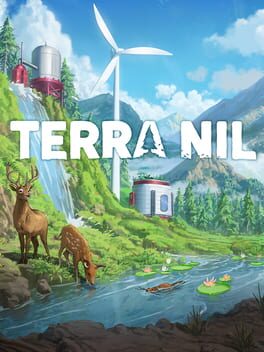Terra Nil is a drop of water on my desiccated tongue.
In line with the heritage of our literally classics, many games tackle the theme of Man Versus Nature. Tame the wildlands, shape it to your image. Even the more environmentally minded works usually focus on turning it into a human habitat. And then came Terra Nil. It's luscious beauty touched the primordial soul of all whove seen it. Housing, industry, worker management? Wrong door pal, we only got flora and fauna here. If you saw it, it got on your wishlist.
This was followed up by a fairly modest launch. I've certainly never met anyone else who played it.
All maps can be divided into three phases. First, you have to make most of it habitable. Second, you introduce different biomes. Last, you clean up your machines and check if your work is habitable by wildlife.
Terra Nil is not a simulation. It's a board game with mostly discrete turns, where tiles transform into different tiles based only on their current state. The game isn't concerned with how much of the sun's energy is turned into heat, how much carbon-dioxide is in the atmosphere. There are larger markers, such as humidity and temperature that introduce some complexity into this. These do provide the challenge of the game. Burning forest tiles will increase the temperature, but you need a certain percentage of forest tiles on a map to complete it. Most of the time paying attention to these values is only required if you wish to complete the myriad secondary objectives each map provides you with.
While the maps themselves are fairly small, we almost except there to be some sort of interplay between them. Planets are complex system, and ecosystems affect eachother across the globe. It would make sense that our achievements in one zone would affect the other. But they don't. There is no metaprogression to speak of. All eight maps of the game stand on their own, independent of one another. We are trained to see this as a missed opportunity, but I think we should stop and really look at this. In game design, metaprogression is generally considered a compulsion loop. It comes from the gambling industry. It's the systems that make you play the game even when you don't really want to. Grind some thing out, get your daily login bonus, all that crap. Gameplay you won't remember despite spending most of your time on. Sure, Duolingo and whatever uses compulsion loops to educate, but it doesn't still doesn't leave a good taste in my mouth. If this game would have met our modern expectations, just a little thinking about it would soil it for me. Maybe it would soil even without us thinking about it. The absence of something gives more than the presence of it. This is a healthy game.
Terra Nil rejects the apocalypse that we are so keen on falling into.
In line with the heritage of our literally classics, many games tackle the theme of Man Versus Nature. Tame the wildlands, shape it to your image. Even the more environmentally minded works usually focus on turning it into a human habitat. And then came Terra Nil. It's luscious beauty touched the primordial soul of all whove seen it. Housing, industry, worker management? Wrong door pal, we only got flora and fauna here. If you saw it, it got on your wishlist.
This was followed up by a fairly modest launch. I've certainly never met anyone else who played it.
All maps can be divided into three phases. First, you have to make most of it habitable. Second, you introduce different biomes. Last, you clean up your machines and check if your work is habitable by wildlife.
Terra Nil is not a simulation. It's a board game with mostly discrete turns, where tiles transform into different tiles based only on their current state. The game isn't concerned with how much of the sun's energy is turned into heat, how much carbon-dioxide is in the atmosphere. There are larger markers, such as humidity and temperature that introduce some complexity into this. These do provide the challenge of the game. Burning forest tiles will increase the temperature, but you need a certain percentage of forest tiles on a map to complete it. Most of the time paying attention to these values is only required if you wish to complete the myriad secondary objectives each map provides you with.
While the maps themselves are fairly small, we almost except there to be some sort of interplay between them. Planets are complex system, and ecosystems affect eachother across the globe. It would make sense that our achievements in one zone would affect the other. But they don't. There is no metaprogression to speak of. All eight maps of the game stand on their own, independent of one another. We are trained to see this as a missed opportunity, but I think we should stop and really look at this. In game design, metaprogression is generally considered a compulsion loop. It comes from the gambling industry. It's the systems that make you play the game even when you don't really want to. Grind some thing out, get your daily login bonus, all that crap. Gameplay you won't remember despite spending most of your time on. Sure, Duolingo and whatever uses compulsion loops to educate, but it doesn't still doesn't leave a good taste in my mouth. If this game would have met our modern expectations, just a little thinking about it would soil it for me. Maybe it would soil even without us thinking about it. The absence of something gives more than the presence of it. This is a healthy game.
Terra Nil rejects the apocalypse that we are so keen on falling into.
